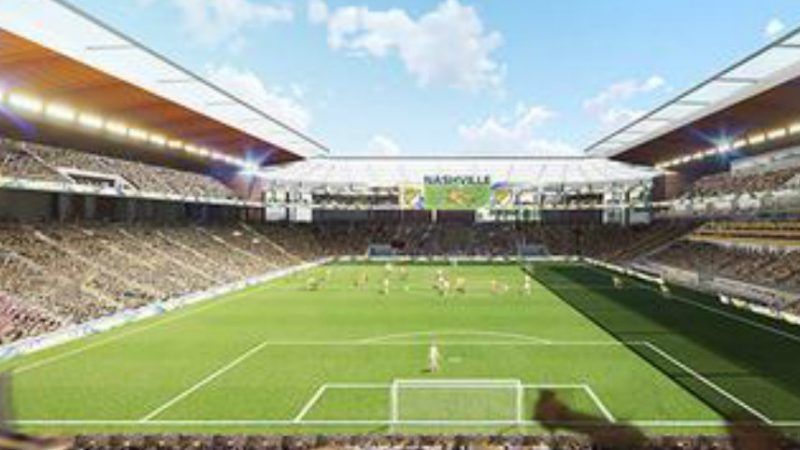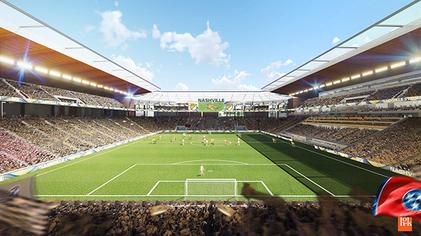Nashville Soccer Stadium Deal Will Gift Land Worth $20 Million to Team's Billionaire Owners
Why can't the team just play in the city's NFL stadium?


Sports stadiums are notoriously bad deals for taxpayers, but Nashville's proposed plan to build a soccer-specific stadium on the city's old fairgrounds adds a new wrinkle. The stadium itself, while probably unnecessary, might not be as bad for taxpayers as what the city plans to do with 10 acres of land right next door.
In order to get the prospective team's owners to agree to a less-than-ideal location—the fairgrounds are well outside of Nashville's densely packed downtown—city officials agreed to gift an additional 10 acres of land adjacent to the 10 acres that will be used for the stadium. There the team's owners plan to build apartments, office buildings, a 200-room hotel, and plenty of bars and restaurants. The soccer stadium, they argue, will be the centerpiece of Nashville's next hip enclave.
While some members of the Metro Council object to the very idea of privatizing public land, that isn't bad in itself. Those 10 acres will bring more economic benefit to the city and more use to residents if they can be privately developed.
The land will also be considerably more valuable. A new assessment of that 10-acre parcel found that it would be worth more than $20 million after it is rezoned to allow mixed-use development. But throughout the stadium debate, Nashville's Metro Council has told residents that the land is worth a mere $11 million—a figure that did not take into account the rezoning. Nashville, bear in mind, faced a budget shortfall earlier this year and may have to renege on promises to give raises to teachers. Giving away land that could be sold for more than $20 million probably wouldn't make sense even if the city was flush with cash, but it seems particularly foolish at a time when tax hikes are being discussed.
The new assessment makes the deal look twice as bad for taxpayers—and makes the free land look twice as good for the prospective team's billionaire owners: John Ingram, one of the heirs to an estimated $15 billion fortune, and Zygi Wilf, who successfully swindled the taxpayers of Minneapolis out of nearly $500 million to build a new glass palace for the Minnesota Vikings.
The Nashville area Metro Council is set to vote next Tuesday on a number of stadium-related bills, including a $225 million revenue bond that will fund its construction, a $50 million general obligation bond to cover demolition of fairgrounds buildings, and the all-important rezoning of those additional 10 acres of land.
The final votes are expected to be contentious. A preliminary council meeting on Monday was packed with stadium opponents dressed in red and stadium supporters waving the blue and yellow scarves of Nashville SC, a lower-level team that already plays in the city. After an hour of back and forth, the council voted 20–9, with 11 members either absent or not voting, to advance the proposal to next week's final hearing. But the final vote is far from a sure bet, since a super-majority of 27 votes will be required to pass some of the bills.
Taxpayers are already on the hook for $300 million in upgrades to Nissan Stadium, home of the National Football League's Tennessee Titans. That stadium is within walking distance of downtown and could easily be adapted to host soccer games. In fact, Nissan Stadium has regularly hosted the U.S. men's and women's national soccer teams. Teams from the English Premier League, widely regarded as the top soccer league in the world, have played there. It's also one of the stadiums proposed as a site for the 2026 World Cup. Why exactly does the city need a new soccer-specific stadium?
Major League Soccer (MLS) says it will not consider expansion bids that do not include soccer-specific stadiums as part of the plan, but the league has been happy to look the other way in places like Seattle and Atlanta, where soccer teams share NFL stadiums. Another MLS team plays in Yankee Stadium—awkwardly, since baseball fields and soccer fields are not really compatible—and the league allows that.
"MLS has two overriding goals: To get as many deep-pocketed new owners as they can, and to get as many new stadiums as they can for those owners—preferably paid for as much as possible by somebody else," Neil deMause, the author of Field of Schemes and a sharp critic of MLS's long-term viability, tells Reason. "This isn't about what the teams need, it's about what the league can demand in tribute."
DeMause thins Nashville's stadium plan is pretty typical for mid-sized soccer-only stadiums: The team is putting up most of the money and getting public subsidies to help, and then the owners get to keep all the revenue. Funding a stadium with revenue bonds—to be paid back by a portion of ticket and concession sales—is better than handing over a bunch of money to the team's owners.
But of course Nashville is doing that too, by handing over those 10 acres of land to the team's owners.
Councilman John Cooper says the selection of the fairgrounds site was a mistake from the beginning. In the rush to get the stadium approved, he says, the Metro Council never considered alternative locations or whether the public was getting adequately compensated for the loss of the land.
"It's taking from one group to give to an in-favor group," he tells Reason. "It's pretty ruthless."


Show Comments (25)